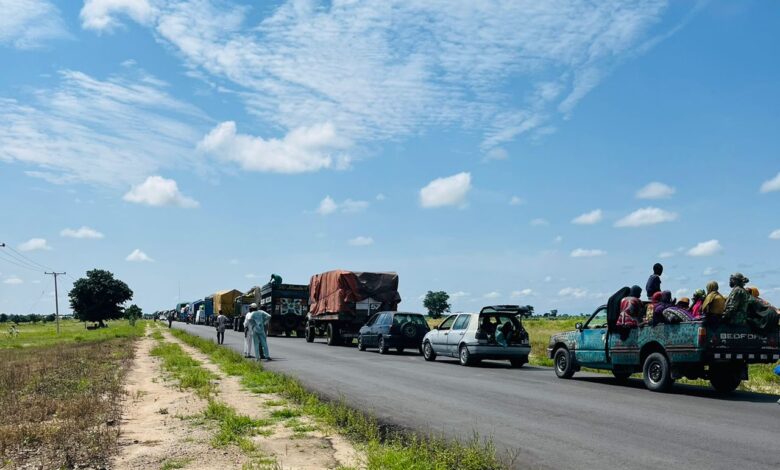Nigerian Army Moves To Counter Extortion Practices Among Officers In Borno
In a recent investigation, HumAngle revealed widespread extortion of road users along major highways in the state, especially by soldiers.

Rather than extort them, soldiers along the Maiduguri-Gwoza highway now exhort drivers plying the route against offering bribes, HumAngle has learnt.
Bulama Pulka, a driver employed by the National Union Of Road Transport Workers (NURTW) in Pulka, North East Nigeria, confirmed that he hasn’t had to bribe military personnel stationed along the road for the past week as the soldiers warned him against it.
“If this continues, we are definitely going to reduce passenger transport fare,” he said, adding though that they can’t be certain how long the reforms will last.
HumAngle published an investigation on June 30, which revealed widespread extortion of road users along major highways in Borno state, including the Maiduguri-Gwoza Road, Maiduguri-Mafa Road, Maiduguri-Monguno Road, and Maiduguri-Gubio Road. The indicted security agencies included the Nigerian Army, Nigeria Police, Nigeria Customs Service, Nigeria Immigration Service, Nigeria Security and Civil Defence Corps, and the Federal Road Safety Corps.
Our calculations showed that over ₦100 million ($130,000) is extorted from drivers on these four routes every year. Officials of the Nigerian Army are present in most of the security checkpoints, followed by police officers. Many more military roadblocks have had to be established in the state since the Boko Haram insurgency erupted in 2009.
Mohammed Dollars, who has conveyed passengers along the Maiduguri to Pulka route for over five years, has also noticed a change in behaviour in most of the checkpoints. He had recently been reprimanded after squeezing a ₦50 note into the hand of a soldier.
“Don’t ever give money to any soldiers at any of the checkpoints. If any driver is caught, wallahi, he will be delayed and punished. You are lucky I am in a good mood today,” the officer had told him.
HumAngle learnt that a military patrol team stationed at the Kauri checkpoint in Konduga was tasked with investigating corrupt practices and spreading awareness among road users.
“We have been implementing new policies to discourage extortion in the past few weeks and even the drivers plying this route know about it, such as disciplinary action for officers and drivers who were caught in the act. But it will take time and effort to change the culture at the checkpoint,” the patrol team leader explained to our driver on Friday, Aug. 11.
“We have met with leaders of NURTW officials, and they have come up with a plan to educate people about their rights and how to report incidents of extortion. We are hopeful that this would help to empower you drivers to take a stand against the practice. In addition, we will be training our fellow officers on ethical conduct and the importance of upholding the law.”
Ali Bukar Dalori, the focal person of the Civilian Joint Task Force (CJTF) for Konduga, Kauri, and Bama, confirmed the development.
“The Nigeria Army mounted on checkpoints are prohibited from collecting money. The new commander instructed the army and us, the CJTF, not to collect any money from drivers plying the route. If anyone is caught collecting money, he will face the wrath of the law,” he explained.
Various attempts to get a comment from the Nigerian Army spokesperson were unsuccessful.
While drivers who spoke to HumAngle are happy about the development and believe it comes with benefits such as improving relations with the state agents and reducing transportation costs, they are also afraid corrupt officials might unleash their frustration on them.
Meanwhile, the National Drug Law Enforcement Agency (NDLEA) has threatened to sanction any of its officers found extorting road users, in reaction to HumAngle’s investigation.
“When you see officers of the agency on the highway, their responsibility purely is to check for drugs and not anything else, and so if you’re not trafficking or carrying drugs, you have no business with them,” the agency’s spokesperson, Femi Babafemi, said on Aug. 16 during a radio programme hosted by the Progressive Impact Organisation for Community Development (PRIMORG).
Support Our Journalism
There are millions of ordinary people affected by conflict in Africa whose stories are missing in the mainstream media. HumAngle is determined to tell those challenging and under-reported stories, hoping that the people impacted by these conflicts will find the safety and security they deserve.
To ensure that we continue to provide public service coverage, we have a small favour to ask you. We want you to be part of our journalistic endeavour by contributing a token to us.
Your donation will further promote a robust, free, and independent media.
Donate HereStay Closer To The Stories That Matter




